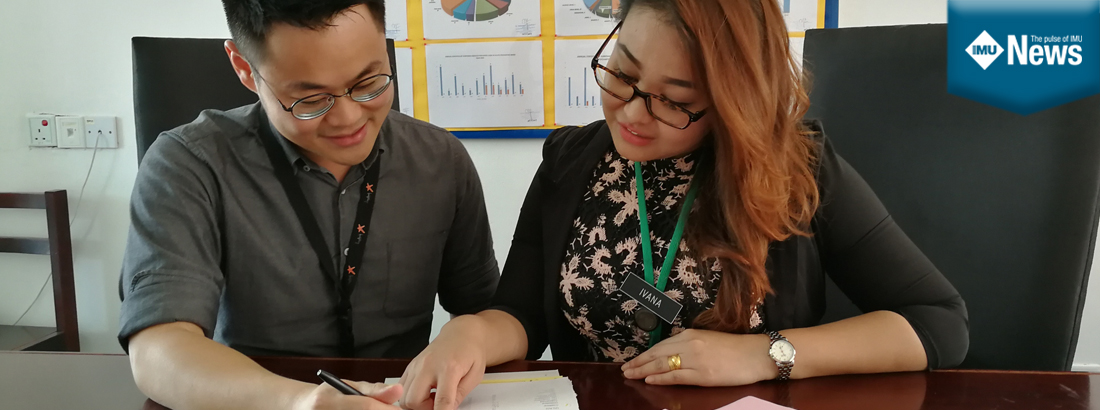Ivana Tiffany Berenai Mason’s interest in a career as a clinical psychologist started when she was researching about the anxieties that she was going through, where to get help and how to reduce the anxieties. This interest led her to enrol herself into the Psychology programme at IMU in 2009 as the first step towards achieving this career. Ivana graduated with her Bachelor of Science (Hons) in Psychology in 2012 and continued her studies in the Master of Clinical Psychology at UKM. Ivana feels that her degree in psychology has helped her build a framework of essential knowledge, giving her a better understanding of the concepts when she specialised further in her Master’s degree. She is grateful to her lecturers at IMU who have nurtured the students by giving them the exposure that they needed in order to progress in the field. She feels that she would not have been able to excel further without this guidance and teaching from her IMU lecturers. Their lessons were practical, interesting and fun. “Occasionally, when I reflect on the time I had at IMU, I would miss the times that I had there as a student.”
After her Master, she did a short internship with a psychiatrist at a private clinic in Kuching, Sarawak for a few months. At the same time, Ivana worked as a Junior Lecturer on a part-time basis in a college teaching two subjects in Diploma of Early Childhood Education.
She then joined a training company that caters to national level corporate trainings for organisations. Although it was not related to the field of psychology, Ivana decided to work at this company to gain experience and improve her communication and interpersonal skills, skills that are greatly needed when handling patients. At this company, she also learn how to interact with difficult people and people from various management levels, especially those in top management.
Subsequently, Ivana applied for a position with the government and was placed in Sarawak General Hospital by the Ministry of Health. “I’d say that I was thankful for the opportunity to serve my own state. It was easier to communicate and deliver my therapy better, especially when it comes to native speaking patients who would usually feel more comfortable to talk about their concerns to me during the sessions.”
Describing her main responsibilities at the hospital, Ivana said, “I work in the Psychiatry and Mental Health Department. Basically, I will receive referrals from the medical officers and psychiatrists on cases that need psychological assessments (IQ tests, psycho-emotional tests, developmental & learning disabilities) and therapies (mostly for Cognitive Behavioural Therapy- depending on cases). I am also responsible for both outpatient and in-ward patients, constantly psycho-educating patients and their caregivers on their condition.”
“Giving talks and teaching is also part of my job scope. I was given an opportunity to teach Post-Basic Nursing students on psychological related subjects in order for them to understand the role of a clinical psychologist as part of the mental health team and the simple therapeutic skills they can use when dealing with psychiatric patients.” So does Ivana get any job satisfaction? Yes, she said. Ivana feels satisfied doing this job when her patients show improvements. She also feels good when she sees patients get back to their normal daily functions and manage their daily living activities well. So does this mean that she does not have any challenges at work? “I don’t usually get challenges on a daily basis but occasionally I do, especially when it comes to personality disorder patients as their overall mood and life management is unpredictable. They may look and feel fine at first but at some point during therapy, their condition may decline suddenly where they would start self-harming and suicide attempts. I am talking mostly about Borderline Personality Disorders (under cluster B of personality disorders in the DSM-5). I would say the level of challenges is highly dependent on a patient’s diagnosis, and personality disorders need time, effort, perseverance and patience to overcome.” So what is Ivana’s motivation to do this? Ivana has a long-term dream of improving the mental health in Sarawak in decades to come. “A big goal like this gives me the motivation to do my best daily when I see a patient. The impact may grow each day through the patients that I meet. Think about it, if the community improves in mental health through constant awareness, and psycho-education that starts from the patients and their family members that we attend to on a daily basis, as well as public awareness talks, I believe we are able to educate our community better, and subsequently move and progress forward to develop as a nation.” She tells us more of her future plans and gives us some advice as well. Your future plans My near future plan first, is to have children. Career wise, I am still thinking and planning it out for the next 3-5 years. I would definitely love to further my knowledge and apply for a PhD that is related to Clinical Neuropsychology. Your advice to those who are considering a degree in psychology / to become a clinical psychologist Take initiatives to seek extra knowledge through constant readings, attend conferences and workshops that are related to the field. Engage in conversations with professionals within the field, and discuss about matters you are unsure of or things that you would like to know more about. Invest in the “I want to know more” attitude. Be passionate of what you want to pursue in. Do not aim to take clinical psychology just because it sounds cool. The journey in this field that you are about to embark on requires constant passion, motivation and patience to carry you through. So if your intentions to take up this field is not substantial enough, you may find it difficult to sail through.
| Personal reflection / messages of the journey you went through to become who you are today |
| Life is a constant learning process, we are never an empty cup until we make the effort to fill ourselves with knowledge. But, also remember that our cup has no limits on how much it can take in. So enrich yourself as much as you can. |
| Passion plays the biggest role in this field. If you have passion you will find a way to help your patients genuinely in the future. Your years of study will only allow you to learn and gain knowledge, but your exposure and experience will play a big role in understanding the field better. |
| Master studies was tough. More often than not, I felt that I am not good enough for the field because of its competitive and rigorous nature. But, I have learned that these worrying thoughts were helpful towards my success and that I needed to work harder to seek for more knowledge. Learning to be open to constructive criticism has greatly helped in my journey as I learnt that everyone that you meet are your life teachers. |
We would like to thank Ivana for taking her time out to answer the questions that build up to this article. The IMU Alumni Office would like to take the opportunity to wish her all the best and all of us at the Alumni Office are looking forward to seeing her soar to greater heights.










